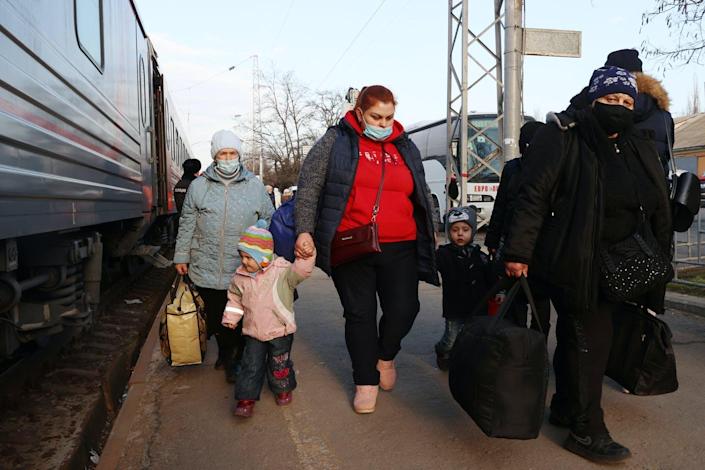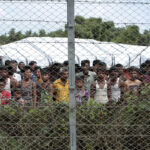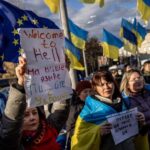Russian President Vladimir Putin ordered troops into eastern Ukraine on Feb. 21, 2022. The invasion could lead to the biggest armed conflict in Europe since World War II, Western leaders warn.
But amid the mounting tensions, public opinion polls in Russia show that support for Putin is rising.
The rally ‘round the flag effect of supporting political leadership during an international crisis will likely be short-lived.
Historical data shows that diversionary wars — fighting abroad to draw attention away from problems at home — have rarely worked for Putin.
Daring and expensive military adventures will, over time, decrease the Kremlin’s popularity, history also tells us.
As a scholar of Russia and public opinion, I know that war ultimately requires an enormous amount of public goodwill and support for a political leader — far more than a brief spike in popularity can ensure.
A shift in Putin’s public approval
Russia’s military buildup along the Ukrainian border over the last few months coincides with a steady rise in Putin’s popularity.
Approximately 69% of Russians now approve of Putin, compared to the 61% who approved of him in August 2021, according to Russian polling agency the Levada Center. And 29% of Russians disapprove of Putin, down from 37% in August 2021. The polling group is the leading independent sociological research organization in Russia and is widely respected by many scholars, including myself.
Support for Russian Prime Minister Mikhail Mishustin and his cabinet also increased moderately in the same time period.
The Russian public largely believes that the Kremlin is defending Russia by standing up to the West.
Putin has enjoyed relatively high approval ratings since he first became president in May 2000. His popularity averaged 79% in his first 20 years in office. Some political scientists attribute this trend to “Putin’s personal charisma and public image” and Russians’ preference for a “strong ruler.”
Other experts argue that Putin’s approval ratings are actually related to Russians’ indifference and symbolic trust in political leaders.
Normalizing war through misinformation
Putin on Feb. 22 received Russian lawmakers’ permission to send armed forces abroad. The same day, Putin ratified treaties with the two separatist regions in eastern Ukraine – the so-called Luhansk People’s Republic and the Donetsk People’s Republic – that have Russian-backed political leadership.
More than 13,000 people have died fighting in the Donbas region, as it is known, since 2014, when Russian loyalists seized power in the Ukrainian cities of Donetsk and Luhansk.
“Every indication is that Russia is continuing to plan for a full-scale attack of Ukraine,” NATO Secretary-General Jens Stoltenberg said on Feb. 22.
But few people in Moscow heard the drumbeat of war until mid-February.
Russian state media has issued continuous denials that the Kremlin was preparing for war with Ukraine.
Russian talk shows regularly mocked Western predictions of a looming invasion into Ukraine as “hysteria” and “absurdity.”
Russian news shows started circulating lies about the security situation in Ukraine around Feb. 21. Anchors on the state television Channel One, for example, have said that Ukraine is forcing its own citizens in the Donbas to flee.
Actually, separatist authorities in Luhansk and Donetsk had announced their own plans to evacuate residents from the two breakaway regions to Russia. The United States has said that false warning about Ukraine attacking the separatist regions could help Putin publicly justify the invasion.
The cascade of fake news is intended to normalize clashes between Russia and Ukraine.
Putin’s Feb. 21 televised speech addressed the dangers of Ukrainian nationalism. He also stressed Russians’ and Ukrainians’ shared history. This presidential address could serve to galvanize the Russian public to back Putin’s military aspirations.
Most Russians don’t want war
About 38% of Russians did not consider war with Ukraine a real possibility as of December 2021, according to Levada Center polling. Another 15% completely ruled out the possibility of armed conflict.
Approximately 83% of Russians report positive views on Ukrainians. And 51% of Russians say that Russia and Ukraine should be independent, yet friendly, countries.
The popular narrative is that Russia is a besieged fortress, constantly fending off Western attacks.
Half of Russians blame the current crisis on the U.S. and NATO, while 16% think Ukraine is the aggressor. Just 4% believe Russia is responsible.
War is ultimately an unpopular strategy
Putin’s approval ratings reached an all-time high of 89% less than one year after Russia forcibly annexed Crimea, a Ukrainian peninsula, in 2014.
The largely bloodless conquest resulted in “collective euphoria” among Russian people, who have often vacationed along Crimea’s scenic coastline.
But Russia’s other recent military actions, including its 2008 invasion of Georgia and its intervention in the Syrian civil war in 2015, were not met with the same enthusiasm.
Public support dropped following both of these military interventions.
Now, Russians have not expressed the same personal connection to the Donbas that they felt for Crimea.
Polls conducted since the annexation of Crimea in 2014 consistently show that most Russians support the independence of the two self-declared republics in the Donbas. But they do not see them becoming a part of the Russian Federation.
I believe the unfolding conflict in Ukraine could result in countless body bags of Russian soldiers returning to Moscow.
Russia’s ensuing military intervention in Ukraine may prove costly for Putin domestically, undermining his legitimacy and forcing him to spend more resources on quashing internal dissent.
This comes as U.S. President Joe Biden announced “swift and severe” sanctions on Feb. 22 that could harm Russia. Russia’s economy already faces high inflation and low projected growth.
U.S. and European sanctions could result in a subsequent economic fallout that will overwhelmingly hurt Russians’ pocketbooks — and further erode Putin’s support.
[Get the best of The Conversation, every weekend. Sign up for our weekly newsletter.]
This article is republished from The Conversation, a nonprofit news site dedicated to sharing ideas from academic experts. It was written by: Arik Burakovsky, Tufts University.
Read more:
Arik Burakovsky does not work for, consult, own shares in or receive funding from any company or organization that would benefit from this article, and has disclosed no relevant affiliations beyond their academic appointment.





